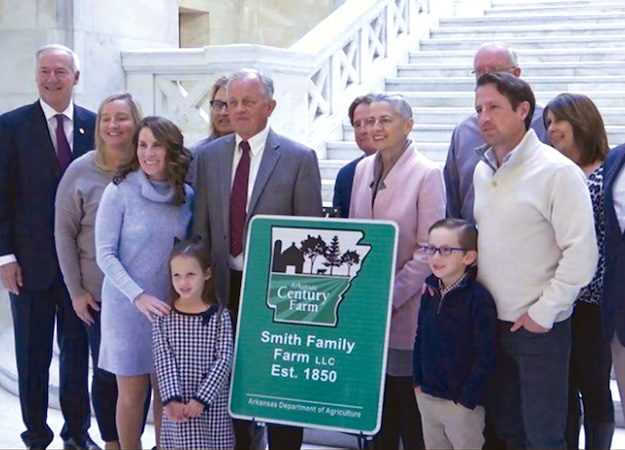01 Feb 2024 A return to his roots
By Judy Riley
Why would 72-year-old successful DuPont retiree Jeff “Dan” Smith return to the land of his roots, 185 acres in the Searcy suburbs? The acreage is small by Arkansas farm standards. He could make much more money selling even an acre for development without the strenuous work of growing horticulture crops. But growing pumpkins and sweet corn on 25 of those acres is just what he does, no easy job even for a young man. The remaining land is pasture and hay. Why come home? That is just it. He is coming back to the farm that has been in his family since 1850. Smith is the 6th generation living and working on this land. In his words, he has always loved the land, is proud of his family’s history and happy to have the chance to keep the land productive and in the family.

The road that brought him back to the Gum Springs Community, just south of Searcy, is very straightforward. As the son of a high school chemistry, biology and ultimately agriculture teacher, he learned to value the land and its resources. Smith worked as a teenager on the University of Arkansas Division of Agriculture (UADA) Strawberry Experiment Station in Bald Knob. There, he met and worked under the supervision of world-famous UADA plant breeders Drs. Jim Moore and John Clark. Together, they developed strawberry, peach, nectarine and blackberry varieties that are grown today all over the United States.
That early exposure to experts in horticulture led Smith to get a degree in agronomy from Arkansas State University (ASU). There, he met his future wife, Diane Kestner, who also had ties to agriculture. Her family grew rice and soybeans near Stuttgart, so this life was not foreign to her. Smith’s career took them to the midsouth, where he worked 35 years for agricultural chemical companies, helping farmers increase crop yields and profits. Ultimately, he worked for the DuPont Co., traveling all over the U.S., working with researchers in product development for horticulture crops. This brought him back to the world of strawberries, blackberries, peaches, nectarines, all those fresh fruits we love.
Smith is active in promoting education in agriculture. He serves as secretary and treasurer of the Arkansas Blackberry Growers Association and is a board member of the White County Farm Bureau Federation, advocating for issues affecting agriculture of all types. He is currently on the planning committee for the Arkansas Department of Agriculture’s Arkansas Grown Conference and Expo, an event showcasing and promoting all areas of agriculture.

Smith officially retired from DuPont in 2020, so what came next? He began consulting with personnel at Ritter Farms, just north of Judsonia. Every week to 10 days, he ‘scouts’ 150 acres of blackberries, advising the farm manager on the overall health of the plants, when to treat disease, and concerns about insects or other plant health. Lest one thinks this is a small farm, think again. It is the largest of its kind in the U.S. Last year, Ritter Farms shipped 325,000 cases of blackberries across the country. They currently hire 300 folks just to help harvest the crop.
Advising that operation would seem a young man’s job, but not for Dan Smith. He stays fit, walking, jogging or exercising, depending on the weather. Then, there is the actual physical farm work, which is not for the faint of heart. His advice to young folks wanting to pursue farming of any type is to “keep active and love what you.” Does he see a successful future for horticulture farming in Arkansas? “Yes, Arkansas has a great opportunity to become even more involved in growing fruits and vegetables, especially in the hilly part of the state. Our rainfall, water availability for irrigation, climate and land availability make it ideal.” The future is bright for this enterprising man and for horticulture in Arkansas.











